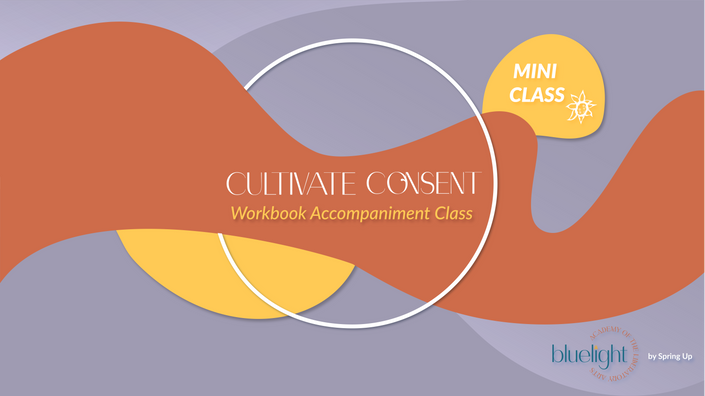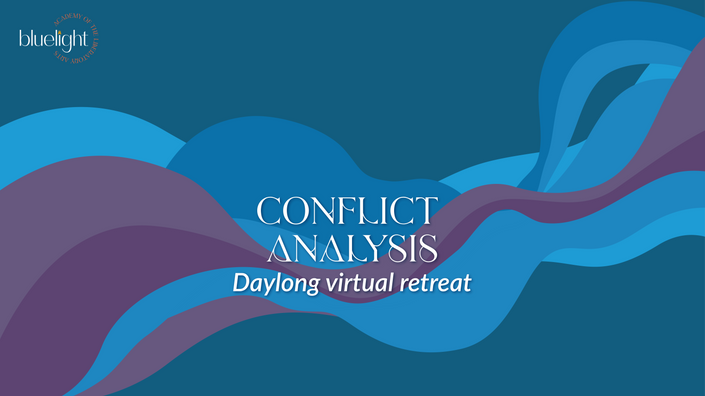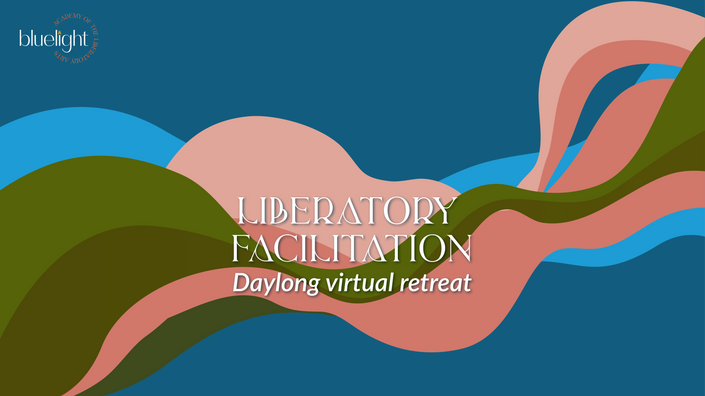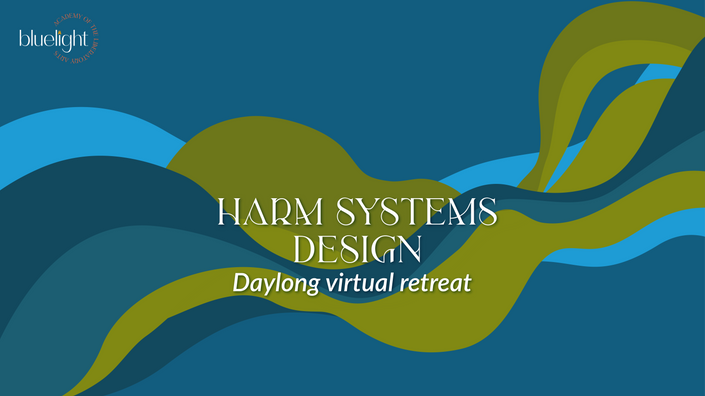Liberatory Leadership Bundle
What will you do to invest in your personal development and support system this Summer? Will you and your colleague(s) learn together at bluelight academy as a way to commit to your collective unlearning and healing?
All three retreats are on Fridays from 8:30am-3:30pm PST / 9:30am-4:30pm MST / 11:30am-6:30pm EST with a 1 hour break from 11:30am-12:30pm PST/ 12:30pm-1:30pm MST/ 2:30pm-3:30pm EST. The first retreat on June 9th is on Liberatory Facilitation, the second retreat on June 23rd, the third retreat on July 7th is on Harm Systems Design. Please keep in mind that the first retreat on February 23rd requires a minimum of two people from an organization to participate to share the learning.
Join Spring Up Collective and peers for all three bluelight retreats and get access to the Cultivate Consent Mini-Class and accompanying print workbook as content for ongoing professional development.
Bundle Contents
3 Coaching Sessions Included!
This package includes two 1:1 coaching sessions for each person, and a group coaching session for you and your colleague(s) who signed up together to meet with one or two of our coaches. Spring Up coaching is a peer-based, flexible, non-therapy offering to help you clarify your goals and build your self-care and communication skills. Our collaborative approach to coaching is based in a non-hierarchical relationship that is solution focused — coaches recognize that clients are experts in their own lived experience. Coaching is strengths-based and culturally specific in that coaches help the client enhance their inherent strengths, skills, and resources accessible to them. Spring Up coaching has an expectation that the client is ready to engage in further learning and implementation outside of the session.



When you register now, you will also get a FREE print copy of the
Resilience + Revitalization Art Zine
Resilience + Revitalization is an invitation to deepen our relationships. How do we grow toward resiliency in a culture that forces many of us to choose constantly between immediate and long-term survival and safety? Featuring new works by over 20 contributors who are young, queer, trans, of color, disabled, incarcerated, and more, R+R offers us all the opportunity to connect with what is necessary to forge the futures we want to live in.
Learn More About Retreats


All 3 retreats are facilitated by Spring Up
Spring Up is a collective of 11 Transformative Justice practitioners, liberatory educators, and care coaches. Each breakout group will be paired with a Spring Up facilitator to guide discussion, answer questions, and go through scenario practice with you.

Learning Portal
When you sign up for the retreat pack, you will get access to each retreat's accompanying online learning portal. On that portal you will be invited to introduce yourself and share a bit about what you are hoping to learn from that specific retreat - this introduction will be used to help us sort you into aligned breakout spaces, so please do so as soon as you are able. You will also see the agenda for that retreat, an introduction to your facilitators, as well as an overview of our community agreements and harm response process.
The learning portal for the Liberatory Facilitation Retreat includes our Facilitation Guide, which is a 25 page workbook detailing all of our core facilitation tools and frameworks, as well as case studies, worksheets to prepare for your facilitation, and suggested resources to learn more.
The learning portal for Conflict Analysis includes the fictional scenario that we will be analyzing throughout the retreat. Our goal is to use a scenario that is fictional but realistic, and around a 3-5 intensity on a scale of 1-10 (with 1 being a little disagreement and 10 being a major crisis). It also includes our power mapping tool to practice intersectionality and identify the many lines of power at play in any situation and an original essay on the patterns of conflict by Spring Up co-founders Stas and Leander.


You will also find our safety and care plan that we encourage you to fill out in order to identify your support system and plan for how to care for yourself before, during, and after each retreat.
The learning portal for the Harm Systems Design Retreat includes two pre-work worksheets, one is required and one is optional for you to fill out before the retreat as well as a few tools to learn more about design thinking as a framework for updating your systems and protocols.

During each retreat:
- There will be plenty of space for you to ask questions or guide the learning based on what you need support in
- We encourage you to take care of yourself and do what will make you feel most comfortable including standing up, sitting down, laying down, stimming, turning your camera off, eating, moving around, stepping in and out of the room as needed
- Closed captions will be on for the entire retreat and all text on slides will be read aloud. There is also space for you to let your facilitator and breakout group peers know if there are other requests that could support you
- Most slides have accompanying visuals to support you in digesting information through text and imagery
- There are consistent breaks and pauses throughout the retreat in addition to the 1 hour break in the middle of the day
- Some breakout prompts include the option to journal independently instead of having conversation which allows you to choose how you prefer to digest and integrate what you are learning
- There are optional prompts throughout the day for somatic and embodied activities to get you into your body or to play a game. It is totally up to you if that is something that feels right, or if you would prefer to opt out.
Before each retreat, we encourage you to let us know if you have specific accessibility needs that you would like us to meet. You can request live ASL interpretation, Spanish interpretation, visual descriptions, or other needs. Please try to give us at least 2 weeks notice for ASL or Spanish access.
Once each retreat is complete, you will get access to the slides from the day as well as suggestions for how you can learn more about the topics explored within the retreat. We will also share a feedback form for you to tell us how the experience was for you or if you have any suggestions to make it a better experience in the future.


Liberatory Facilitation 1-Day Retreat
The Liberatory Facilitation daylong retreat is great for anyone who facilitates learning experiences, whether they are teachers, trainers, community accountability facilitators, or leaders. Through dismantling notions of what ‘should’ happen in facilitated spaces and how people ‘should’ learn, participants learn skills to lead people and spaces towards differentiation and self-directed learning.
The Liberatory Facilitation Retreat is for you if:
- You want to experience a liberatory space as a participant
- You have struggled to make virtual meetings or training spaces feel relational, engaging, fun and experiential
- You want to make your spaces more trauma informed / responsive
- You have felt frozen or anxious when something goes wrong while you are facilitating
-
You have seen participants call each other or you out or say harmful things, and were unsure of how to respond



Conflict Analysis 1-Day Retreat
The Conflict Analysis daylong retreat is great for anyone who is interested in deepening their understanding and analysis skills of conflict. Within the retreat, participants will examine fictional scenarios and engage with tools to support empathy building, understand and map power dynamics, investigate the scale of the harm, and discuss the choice points available throughout the conflict.
The Conflict Analysis Retreat is for you if:
- You are afraid of conflict because it seems to be associated with things going wrong, getting distracted from the core work, or people losing trust in one another
- You have felt stuck in conflict where you and the other person (or people) don’t seem to be able to translate to one another or work past your differences
- You have had a hard time digesting and integrating critical feedback
- You have been told that you are too confrontational or direct
- You have been told or noticed that you are conflict avoidant
- You have seen how race, gender, disability, and class shape how someone is perceived in conflict as “too emotional,” “angry,” or “scattered”
- You tend to be pulled into other people’s dramas, or people tend to open up to you about their issues and you want better skills to support them
-
You can feel like you are powerless or have no options to address a situation at work, in your family, or in life in general



Harm Systems Design 1-Day Retreat
The Harm Systems Design daylong retreat is great for organizational leaders, people from Human Resources or community accountability teams or entrepreneurs thinking about how to create systems in their endeavors. Through an examination of Organizational Accountability, what harm looks like in the participants’ context, and consideration of the legal liability requirements of organizations, participants will leave with examples and inspirations of how they can respond to harm given their unique context.
The Harm Systems Design Retreat is for you if:
- You have been told that your organization or people within it have harmed folks in the community, their colleagues, or program participants
- The system designed to respond to a harm you've experienced did not comprehensively meet your needs
- Your organization keeps being pulled into controversies and conflicts in community and you are unsure how to set boundaries around what is your place to address
- You have heard about transformative justice and are curious how those philosophies and principles could be applied in your organization
- You want to think about accountability beyond task completion and deadlines
- You want to think about harm response beyond legal liability and HR
- People on your team are burnt out and overwhelmed
- Your team or community have experienced “incidents,” “DEI breaches,” microaggressions, anonymous social media accounts, or public call outs
- Feedback on your team tends to be either only positive or quite harsh
-
Your organization's values conflict with your HR protocols
How We Approach Organizational Accountability
Our curriculum reframes traditional diversity, equity and inclusion (DEI) frameworks and practices, standard professional best practices, and accountability in an institutional setting to create a shared understanding of Organizational Accountability. We found that when people wanted to learn about DEI, they were often actually wondering how to understand, prevent, and respond to harm. The core issues people face in relation to diversity, equity, and inclusion are microaggressions, harm, and structural inequity.
Our practice of organizational accountability grounds itself in the knowledge of who the organization is designed to be accountable to, and what it is accountable for by implementing governance and feedback systems that center those directly impacted by the organization's mission and vision. Organizational accountability is about translating values into practice, practicing generative conflict, preventing and responding to harm without centering liability or the state, and responding to patterns of harm and conflict through emergent and adaptive organizational strategy. Spring Up’s frameworks of accountability and the Organizational Accountability Wheel are informed by grassroots transformative justice and community accountability practice, and draw on the wisdom of the Indigenous Medicine Wheel, as expressed by the People of Standing Rock / Lakota, and integral theory by Ken Wilber.
This daylong retreat is an overview of the Organizational Accountability Wheel, including core tools, policies, and frameworks to have holistic harm prevention and response mechanisms. Participants are expected to complete two reflection worksheets before the retreat itself, and then continue the work of translating what they learned into their organization beyond the retreat itself. Organizations also have the option to book the two day version of this experience for their private group, in which we go beyond overviewing the core concepts into self-auditing where your organizations systems currently are and co-designing next steps to implement these best practices in your community. If you are interested in the extended version of this experience for your organization, please email [email protected] with the subject “OAW retreat” including the size of your group.



This retreat requires a minimum of two people from an organization to participate to share the learning. This retreat is a space for several people within one organization or collective to reflect on the harm response tools already in place and how to strengthen them. We strongly encourage you to include people from different workstreams in your organization, especially folks who do HR, are in senior leadership, and/or are in the day to programming with your clients or community members. If 4 or more people from the same organization register together, you will have a private breakout group with an aligned facilitator. The breakout space can be used to strengthen relationships among colleagues as well as problem solve and strategize around your programs and how you will directly implement what you learn.


We intentionally pair breakout groups based on the kind of work participants do or challenges they are dealing with. If you have two or three team members registered, you will be paired with 1-3 other organizations and one Spring Up facilitator, with space to get to know one another, set your intentions, and share how you are entering the space / what your access needs are for the day.
If you are a solo practitioner or only have one person in your organization, please email [email protected] before registering for this course explaining your situation and how you intend to apply what you learn.

Sign Up for Just One Retreat
Click on the any of the retreats below to learn more about it and register for just that day.
Learn More About the Cultivate Consent Mini-Class
This mini-class is an introduction to the basic principles and frameworks of Consent. It includes 8 of our collective members going through the core content of our Cultivate Consent workbook, the first workbook we ever released, and talking about the roots of gender based violence, boundaries, harm reduction, verbal and nonverbal communication, and visions of a consent based future. This class is supportive to anyone looking to level up their consent skills in all aspects of life.
This self-guided mini-course will be broken down into the following topics:
- What Is Consent with Stas (they/them) + Leander (he/they)
- Consent is Accountability with Stas (they/them) + Leander (he/they)
- Gender Based Violence + Power with Thanh (they/them)
- Harm Reduction + Support + Boundaries with Britt (they/them)
- Nonverbal Communication + Embodiment with Shaina (they/them) + Sevine (they/he)
- Asking / Answering Questions + Communication Styles with Brianna (she/her)
- Internal Consent + Culture of Consent Vision with Juli (they/them)
The Cultivate Consent Workbook
The Cultivate Consent Mini-Class includes readings and resources in a variety of media, videos made by Spring Up collective members that synthesize key learnings, pages from our Cultivate Consent Workbook, and additional resources to explore the topics.
When you sign up for this bundle, you will get a copy of the Cultivate Consent Workbook shipped to you for FREE!

This course is intended as a “taste of Consent”, a window into this framework that we believe has the power to radically transform the ways we care for ourselves and each other. The Consent mini-class was put together with accessibility in mind and is the equivalent of about a half day training on Consent. The content can be reviewed by a group or team aiming to skill up together - like a multi-media book club. You can review one module and the accompanying workbook pages before each meeting or discussion (~30 minutes of work), and then use the included reflection questions to prompt discussion.
In this course you will learn:
- The history and roots of consent
- Why consent is not necessarily enthusiastic
- Nonbinary tools to analyze power and abuse in queer and trans relationships
- A queer and trans centered framework for understanding gender based violence
- The state's role in upholding gender based violence
- The history of harm reduction and how we can apply it to gender based violence
- How to identify support resources and people in your life
- How to have flexible but reliable boundaries
- How to connect with your body and identify warning signs that you are feeling overwhelmed / what to do about them
- How to identify dissociation and support someone in coming back into their bodies
- How to say no, yes, and maybe
- Different styles of communication and when they are / aren't supportive in consent based conversations
- How to ask questions non-coercively
- Embodiment and meditation practices to connect to your own consent practice
- How to create a more consensual future for all of us inside and outside of intimate situations
Welcome Video
Below you will find a welcome video from Spring Up co-founders and vision keepers Leander Roth (they/he) and Stas Schmiedt (they/them) explaining more about the class and what you can expect if you sign up.

Can my organization or workplace pay for me to register for the retreats?
- Yes, email us if you need an invoice for your group
- You can also register yourself and you will receive a receipt for reimbursement
- Email [email protected] with any other questions
- 2-10 people from an organization can register for this retreat. If you have more than 10 people who want to take this, we encourage you to reach out and schedule a private version of the retreat just for your organization.
Who else will be at the retreats?
We are excited that these spaces are a place for folks to connect across the ecosystem of liberation work. Many of our participants are leaders in nonprofits, education, grassroots community organizations, therapy or social work, intentional communities and philanthropy. We encourage you to make new connections or attend with your colleagues and focus on your own community. We do not have participation requirements: we trust that if this seems like a good fit for you, you are welcome.
How long do I have access to the online portals with the slides and resources?
Forever! Access to the online content associated with this retreat does not expire.
When will these retreats be offered again?
These retreats are offered three times a year, in the Spring, Summer, and Fall.
Can you share more guidance on how to choose the right price out of the sliding scale?
If you are a resourced formal institution, like a school, foundation, business, or nonprofit with a budget of over $1M, we ask that you pay at the top of our sliding scale options. This helps to subsidize our ability to provide at cost services to informal community based organizations and student groups with small budgets, who we invite to pay at the lower end of our sliding scale. Somewhere in the middle lie small and medium nonprofits, conferences and events, advocacy groups, etc, where we will follow your lead on the budget you have available for professional development, continuing education, and/or community engagement.
Do these retreats work for people outside of the US?
Each individual can choose if the timing of the retreat works for them based on their time zone. If the time zone differences would make it difficult to attend, we would encourage you to sign up for one of our 6 week courses instead, or email us at [email protected] to set up a private retreat on your schedule.
Are these retreats only in English?
We can offer live translation to Spanish and ASL interpretation for each retreat with at least 2 weeks notice.
What is the difference between the Cultivate Consent Mini-Class and the 6 Week Consent Gender Power Course?
This course is intended as a “taste of Consent”, a window into this framework that we believe has the power to radically transform the ways we care for ourselves and each other. It is not a replacement for our more comprehensive 6 week Consent, Gender, Power course (registration is posted to our bluelight.academy homepage), but can be a good way to prepare for that course or identify if you want to go deeper. The Consent mini-class was put together with accessibility in mind and is the equivalent of about a half day training on Consent. We know that not everyone has the time or the money to invest in a 6-week intensive course on Consent, Gender, Power. Where that course is designed to give you all the tools you need to begin engaging with Consent and Gender Education in community with your peers, the mini-course is intended more as a handshake or an appetizer, to help you get to know our healing and liberation work and invite you to join us in it.
What if I can't attend one of the retreats?
That's okay! You can leave a comment or email us at [email protected] to postpone attendance to a future term. These are offered three times a year (always on Fridays at the same time of day).








